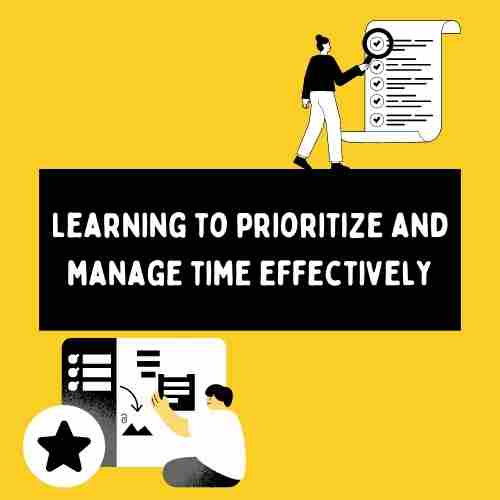Learning to prioritize and manage time effectively
It’s crucial to have time management and prioritization skills if you want to succeed in both your personal and professional life. We can prioritize chores, work more efficiently, and experience less stress when we manage our time well. However, it can be difficult to know where to begin when there are so many demands on our time. In this post, we’ll look at some useful advice for setting priorities and using your time wisely.
Prioritizing clearly is the first step toward time management success. This entails deciding which of the necessary jobs and activities are the most crucial and then ranking them accordingly. Making a to-do list or schedule for the upcoming day or week will be useful for achieving this.
Once your priorities are clear, it’s critical to manage your time well. This entails scheduling precise blocks of time to work on each activity and refraining from multitasking or allowing other distractions to divert your attention. To retain focus and productivity, it might also be good to divide major jobs into smaller, more manageable ones and to arrange regular breaks.
Learning to say no is a crucial part of efficient time management. This entails being aware of your limitations and refraining from overcommitting to jobs or pursuits that are not urgent. You can prevent burnout and make sure you have the time and energy to concentrate on the things that matter most by setting boundaries and prioritizing your time.
If you want to be successful in both your personal and professional lives, you must have strong time management and prioritization abilities. When we manage our time effectively, we can work more effectively, prioritize our tasks, and feel less stressed. With so many demands on our time, it can be challenging to know where to start. We’ll look at some helpful tips for prioritizing tasks and managing your time in this post.
Setting clear priorities is the first step to effective time management. This requires rating the necessary tasks and activities in order of importance after determining which ones are most important. This can be done by creating a timetable or to-do list for the forthcoming day or week.
Finally, it’s critical to have a flexible mindset when it comes to time management. Because of unforeseen events, you might need to change your priorities or goals because of the unpredictable nature of life. You can keep a sense of control and balance in your life by being open to change and prepared to make adjustments when necessary.
In conclusion, developing time management and prioritization skills is essential for success and lowering stress in both personal and professional life. You may maximize your productivity and accomplish your goals while preserving a healthy work-life balance by having clear priorities, managing your time effectively, saying “no,” making the most of the resources at your disposal, engaging in good self-care, and being adaptable and flexible.
You may like to read (Tips and Techniques)
- Building Resilience and Grit in the Face of Adversity.
-
Finding a balance between creativity and structure to achieve success.
-
Overcoming limiting beliefs and self-sabotage on the path to success.
-
The role of education and continuous learning in achieving success.
-
Developing financial literacy and management skills for success.
-
Strategies for effective self-promotion and marketing for success.

